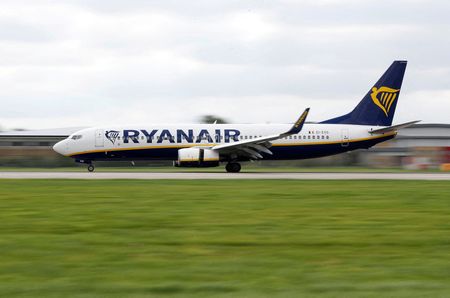 1
1 1
1

By Conor Humphries
DUBLIN (Reuters) – Ryanair expects huge pent-up demand to lead to record summer passenger numbers and higher ticket prices if the recovery is not thrown off course by a new COVID variant, Group Chief Executive Michael O’Leary said on Monday.
But he said the budget airline’s outlook remained uncertain and it was currently cutting fares aggressively to try to restore passenger numbers to pre-pandemic levels by March.
O’Leary was speaking to investors after Ryanair reported a loss of 96 million euros ($107 million) for the final three months of 2021, in line with a consensus estimate of a 101 million euros loss in a company poll of analysts.
The Irish airline, Europe’s largest by passenger numbers, reiterated its forecast for a loss of between 250 million and 450 million euros for its full financial year ending March 31.
Ryanair has seen a “very strong bounce back” in bookings in recent weeks, O’Leary said, which should help passenger numbers recover rapidly from 6-7 million in January to 8-9 million in February and 11-12 million in March – reaching pre-COVID levels for that month.
Ryanair’s aircraft should be almost 90% full by April and above that level in the summer, O’Leary said. The airline has said it is profitable when occupancy reaches 80%.
Ryanair is unlikely, however, to return this year to filling 95% of seats as it did before the pandemic, he added.
Ryanair expects to fly 14% more capacity this summer than in the same season of 2019, and will carry a record 165 million passengers in the year to March 2023 up from just under 100 million in the current year and a pre-COVID record of 149 million.
The Easter holidays in April are critical, O’Leary said. If they pass without a major COVID setback, “we think we will be set fair for a very strong summer recovery,” he said.
While it was too soon to forecast summer fare levels, O’Leary said they should be helped by the likelihood of around 10% less short-haul capacity in Europe than in the summer of 2019 due to airline failures and cuts by rivals.
“With the combination of less capacity short-haul and higher oil prices, I struggle to see why … there won’t be a strong pricing recovery – certainly into the peak summer months” absent negative COVID developments, he said.
Rivals easyJet and Wizz have both said in recent days they expect strong demand for summer holidays, but Wizz said excess capacity could weigh on pricing.
A higher level of fuel hedging than many rivals will give Ryanair the option of being “aggressive on pricing” to fill planes if necessary, O’Leary said.
The company is currently in talks with staff about restoring COVID pay cuts, a process that may be accelerated if staff agree to a longer-term pay deal, O’Leary said.
(Reporting by Conor Humphries Editing by Edwina Gibbs and Mark Potter)